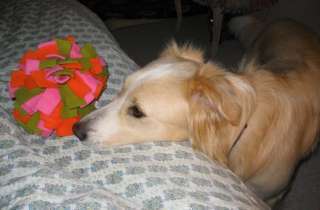
My whole routine has changed. I don’t know how to start the day. It used to be that when I first began to stir in the morning, a head with a long nose and two big brown eyes would jiggle the mattress, and a tail would thump softly against the bed. Now there is only stillness.
Bacho, my lovely companion of nine years has ended his time on planet Earth and begun his journey into the unknown — at least unknown to me, although it may be well known to him by now.
Bacho of Bacho Press
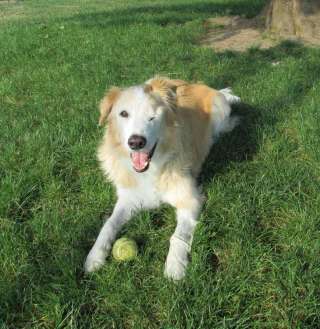
Yes, he is the eponymous Bacho of Bacho Press, my nascent publishing house. Since I could choose any name I wanted and the domain name was open, why not honor my enterprising friend? After all, his specialty was communication. I’m sure he would have had me publish an adventure story, a book about cooking for your dog, or maybe something like Diane Ackerman’s brilliant A Natural History of the Senses. Instead I chose to publish a book about cancer and the courage to heal, which never even mentions his name. But Bacho had first-hand experience with cancer, and his courage was extraordinary. With two bouts of cancer, one radical surgery in which he lost an eye, and considerable discomfort along the way, he never complained, but kept enjoying life as long as he could. It’s as if he was following exactly in Jack’s footsteps.
Adoption and Confusion
Bacho was a two-year old golden retriever, border collie mix who came into our lives only a month before Jack died. Our German shepherd had succumbed to cancer in March of 2006, and soon after that Jack started to read the ads in the local paper: “Wanted, good home for our dog.” I was hardly ready for that because I was still grieving, but Jack seemed determined to have another dog. I can’t help but wonder about his prescience. Did he suspect that I would soon be alone?
Bacho’s family was moving into an apartment where pets were not allowed. As soon as we met him, we fell completely in love and brought him home the next day. Shortly after that, I left for a long-planned trip to England to visit relatives and attend a chamber music festival. It was in the little village of Chipping Camden that I received the news about Jack’s sudden death. I’ve written of the shock and grief of that chaotic time in the epilogue of my memoir, An Uncommon Cancer Journey. That portion of my life feels imprinted not only in my brain and heart, but throughout my entire body. And yet we go on.
That time must have been very confusing for Bacho as well. Jack had died in his sleep on Sunday night and it wasn’t until Tuesday that our friend John Stromberg, after worrying about him, found his way into our house and discovered Jack’s body. Bacho was very grateful to be let outside, and it turns out that he had not soiled the house the whole time.
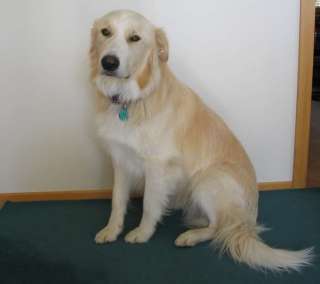
Later, our friend Cate Hartzell told me that as she sat quietly with Bacho on the front porch that evening, she felt that he understood the depth of what had taken place. Cate took him home and kept him for a couple of weeks while I worked on putting my life back together.
After that Bacho went to the farm of my friends Jana and Richard for a few more weeks until I was ready to bring him home. It must have been one of the more exciting times of his life, chasing cats, hanging out with horses and other dogs, and collecting ticks by the hundreds, which we picked off or drowned in bathwater before he finally could come back into the house.
Commitment
Since that time, Bacho and I have been inseparable. We walked together every day, starting before breakfast, again in the afternoon, and a short walk before bed. Whenever I would travel, I left him with friends or hired a pet-sitter. I never boarded him in a kennel. During these walks he would meet other dogs, toward whom he was usually indifferent, but if their owners offered attention or, better yet, treats, he would show great enthusiasm, sitting in front of them, tail sweeping the sidewalk. When people would come to he door he would never bark, but instead whined until I let them in and he could make a fuss over them. He would continue whining for a while as if he were saying, “Oh, you lovely person. Where have you been all my life?” Thankfully, he was never challenged to be a watchdog.
A Dog of Great Character

Bacho was an intensely social dog. The better he knew someone, the more joyful the greeting. Among his favorite people were friends who would kneel down and return his affection, and, of course, those who offered treats. He was so devoted to our letter carrier, Ed, that he knew when the Postal Service van had parked nearby and would start to whine even if he was upstairs. Then, when I let him out, he would follow Ed up the steps to each house on the block and would have gone further if I hadn’t called him back. One time, many months after Ed had discontinued this route, Bacho saw him on the street and rushed toward him, greeting him ecstatically. Ed confessed that he hoped he would see Bacho while visiting our neighborhood.
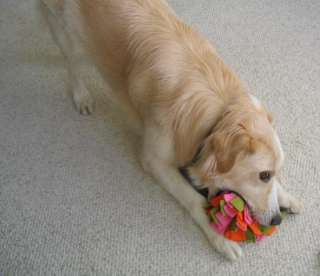
Whenever a group would come to the house, Bacho would make sure to make the rounds, connecting with each individual. In his younger days he would show off his toys or engage in antics with our cat. Whenever someone would spend the night, Bacho insisted on sleeping in their room and was visibly disappointed if they refused. I accused him of disloyalty, but I knew that he was definitely a pack animal and he needed to keep track of everyone. But he also wanted to ingratiate himself, and that he certainly did. On learning of his death, I wasn’t the only one to cry, and I know they were not crying only for me.
Although Bacho’s id was pretty strong, he had a severe superego. He would gobble up almost any food item that dropped on the floor, especially if this was accompanied by the word “oops,” although he would never steal anything from the dining table or even the coffee table, which was at his level. Whenever I would leave the house, he felt compelled to get up on the bed, but he never did it while I was at home, even if, as a kind of disingenuous experiment, I invited him up. When I would come in the front door I could hear the thump as he jumped down, and then he would come downstairs, ears laid back, tail waving meekly, head down in the depth of shame, even though I greeted him cheerfully and pretended that I didn’t have the slightest idea of what was going on.
A Dog of Great Sensitivity
Bacho was also a very sensitive dog. His duty to keep me happy almost felt like a burden at times. If, when talking on the phone, I expressed anger or dismay, he would leave the room. He knew that dealing with robots elicited my impatience, and that sometimes I would use colorful language at a higher than normal volume. I don’t know how he did it, but he could actually tell the difference between robots and real people at the other end of the line, and would stay or leave accordingly. Even if I spoke politely to these recordings, he knew that it was a potentially dangerous situation.
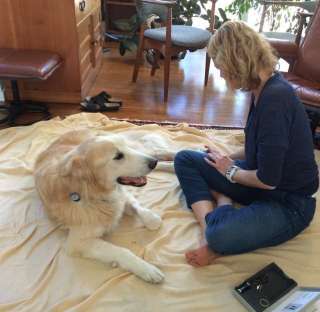
Bacho’s extraordinary sensitivity meant that I couldn’t cry in front of him. It was as if he took on the whole burden of my sorrow or frustration, that it was all his fault, and that he obviously wasn’t doing his job. That meant that I couldn’t openly grieve when he was dying. Toward the end, he tolerated tears, but on the occasions when I couldn’t muffle a sob and it was too much effort for him to walk away, he would gently wag his tail in an act of contrition. I’m sure he knew of my suffering, and that only added to his suffering, but there was nothing to do except reassure him that he was the best dog ever and that I would always love him.
Our Broken Hearts
At this point you could ask, why do we do this to ourselves? Why do we fall so deeply in love with a creature who will live only a short time and break our hearts? In her marvelous poem, Death, Etc., Maxine Kumin, who surrounded herself with animals, refers to the annual family photograph, which always included “a pair / of grinning shelter dogs whose long lives are but as grasshoppers / compared to our own.” In another poem, How It Is, she refers to “the dog at the center of my life….” She knew about the brevity of their lives and nonetheless chose to love them.

Sometimes the loss of a beloved pet is a strange sort of gift in that it brings up old losses that may have been floating beneath the surface for years, losses that are deeper and often more complex, losses that may need additional grieving. Losing Bacho has reminded me of the deaths of both parents and my relationships with them. And losing Bacho has naturally rekindled the grief of losing Jack. As a healing ceremony, I have placed their pictures together and say their names as I light a candle every evening. Added to my awareness is the loss of my youth and the inevitable trajectory toward debility and death. These are not happy thoughts, but they are necessary ones so as not to be dumb struck by the process when it happens.
Death
For many years I’ve had trouble with the concept of death as it is in nature, where everything seems to revolve around eating or being eaten. I hated the TV nature shows where the principle occupation of lions was to stalk and kill antelope, and antelope’s main occupation was running from lions while eating a little grass on the side. It felt grisly, and I kept thinking: Is that what it’s all about? Somehow I managed in my mind to separate these concepts from my relationships with my dogs and cats. And yet, these pets were all carnivores, and I have fed them meat from animals who were killed for the purpose of providing food.
We need death for food — but not only for food, we need it for rejuvenation, for variety, for progress. In his Complete Essays, French philosopher Michel de Montaigne reminds us that death demands us to “… give place to others, as others have given place to you.” When we consider the sweep of civilization, our lives are much shorter than grasshoppers, just a dot along the line.
Death is inevitable in the great biological cycle on our planet. How startling it is even to contemplate life on Earth where there would be no death! How boring to think that we would just go on and on, getting older and older, with no birth, no cycles, no change! It would be horrible. It is death that gives us some kind of limit, a natural boundary, the incentive for a bucket list, and, most importantly, the chance to ponder why we are here in the first place. Mortality is the great goad that makes us wake up and take stock of our lives. Before it is too late.
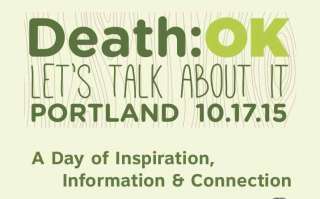
Next month I will take part in a workshop at Reed College called Death:OK. Every lecture, seminar, art exhibit, or performance is about death. It is organized by a team directed by Holly Pruett, whose work is all about the cycle of life. Holly provides ceremonies for the five major life cycle events: Beginning, Coming of Age, Weddings and Unions, Mid-life, and End of Life. Each stage in the life cycle is unique and critical. Our culture would do well to pay more attention to them.
In the meantime, I am learning to walk the neighborhood without a dog, and I find that quite often people smile at me anyway.
In a room of my life the air will always
carry your name.
Because you lived and enriched my life
I will love others.
Without stint, I will turn to new days
carrying the gift you gave.
From Selina by William Stafford:

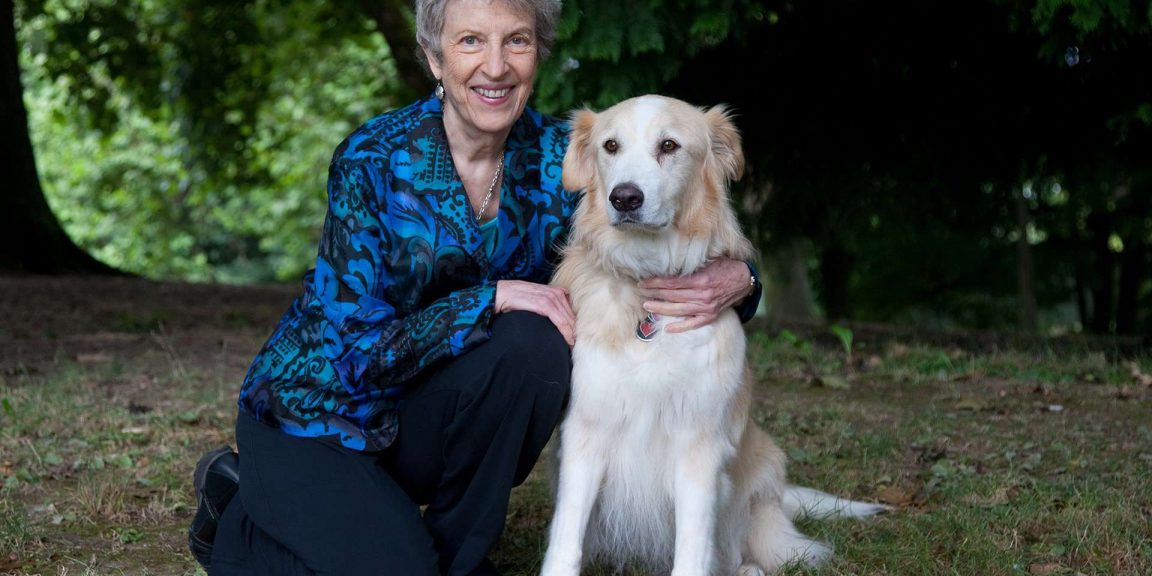
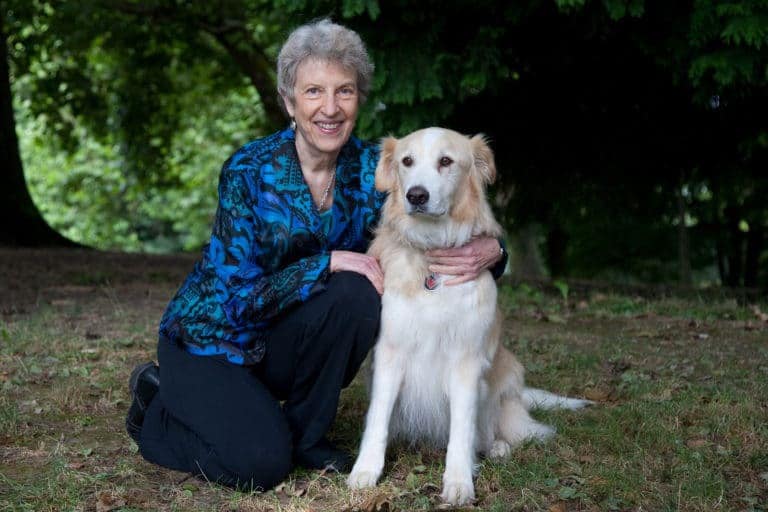
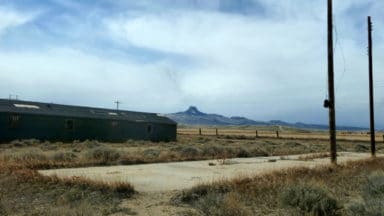


9 thoughts on “Losing Bacho”
This is such a beautiful expression and sharing of what it means to be alive and present even in death. We miss dear Bacho and feel fortunate to have had his presence as a neighbor as a bonus added to the delight of knowing you. Thank you for telling your story and truth and offering it up for others to engage and be inspired through it. Much love to you, Alice.
What truly lovely sentiments Alice. Your essay has brought those familiar feelings of loss to me again as well– bitter sweet memories of beloved pets– kitties, horses, and of course the dogs, especially the bernese that Mark and I have been blessed to share our home with…Cody, Wookie, Mintaka, and most of all Albie. How I miss Albie. I am relieved that Hubble and Nexi bless us now with their warm noses and nudges. Each fur baby is special in his or her own way, and each a little different, aren’t they… I hope I am never without a dog for they are good for my soul.
This from Erica Jong: Dogs come into our lives to teach us about love. They depart to teach us about loss. A new dog never replaces an old dog: it merely expands the heart. If you have loved many dogs, your heart is very big.
Alice, what a lovely tribute and testament to LIFE. Thank you once again. I have always avoided getting a pet because I have had so much loss in my life, I thought I couldn’t bear to love someone I KNEW I would lose. Then my sister and I moved together, with her Jack Russell, Kiwi, and her life partner, Chris. Kiwi died 3 years ago at 17 and we all miss her. Vici and Chris still cry occasionally. I know that when I live alone again, I will get a dog of my own. Loving this creature that seemed to know only how to love has softened me.
A lovely tribute to a sweet dog. Arrow and her humans will miss seeing him around the neighborhood. I am so sorry for your loss. I know it may sound trite, but he’s not completely gone. You carry some part of Bacho in your heart, and he lives on in the memories of his friends. (hugs)
Alice, this is such a beautiful tribute to Bacho and takes us all back to those times of loss that add and add over the years, each one bringing in its wake all the ones before it. But as you and Bill Stafford said so perfectly, though they are gone, they have given us something essential that will light the way forward.
And as E.J. would say, ours hearts are getting very big.
Thanks for the wonderful tribute, which has now extended Bacho’s life a little longer and wider. I’m glad I got to meet him, and glad to know that he came along at the exact moment you needed him most,and helped you through your toughest times.
You and others might be interested in Oregon Humanities’ ongoing Talking about Dying series, which is going on all over Oregon this month and next, including Portland again later this month. http://oregonhumanities.org/programs/special-projects/talking-about-dying/1116/.
Thanks for the suggestion, Brett. And there’s also the program I mention in my post, “Death: OK” at Reed College on Oct. 17th.